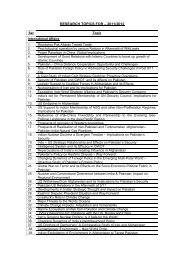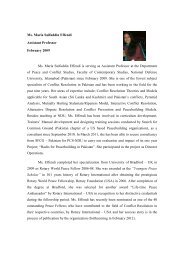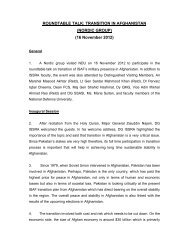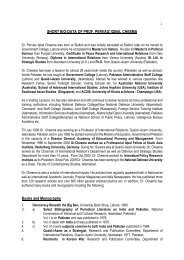OPINION Vol.1, No.1 June 2013 - National Defence University
OPINION Vol.1, No.1 June 2013 - National Defence University
OPINION Vol.1, No.1 June 2013 - National Defence University
Create successful ePaper yourself
Turn your PDF publications into a flip-book with our unique Google optimized e-Paper software.
Global Interests<br />
The GHG emitted from anywhere on the earth affect the entire globe. The harmful impacts of<br />
global warming are already manifesting themselves around the world in the form of extreme weather<br />
events like storms, tornadoes, floods and droughts, with increasing frequency and intensity. As a result, the<br />
world today suffers around 400-500 natural disasters on average in a year, up from 125-150 in the 1980s.<br />
The main effects of global warming include melting of Arctic sea ice, thus releasing more water to world<br />
oceans which may lead to changes in oceanic circulation, rise in global ocean temperature resulting into<br />
extensive and frequent hurricanes and rising sea levels. Additionally, erratic rainfalls that cause floods of<br />
unprecedented magnitude as well as extreme drought and high intensity heat waves affecting cropping<br />
seasons, productivity, life cycles, health and even extinction of many species.<br />
International Efforts towards Climate Change. United Nations conference on Environment<br />
and Development held at Rio de Janeiro in <strong>June</strong> 1992 commonly known as Earth Summit 15 is a benchmark<br />
event in the history of climate change. Later, United Nations Framework Convention for Climate Change<br />
UNFCCC was negotiated, which provides the basic document for future course of action. The objective of<br />
the treaty is to cut GHG concentrations in the atmosphere to 350 ppm, the 1990 level; that would prevent<br />
dangerous anthropogenic interference with the climate system. Developed countries are responsible for<br />
increased emissions and must take lead in cutting emissions. However, it is cost prohibitive, therefore<br />
negotiations often stall. Progress was only made after, "flexibility" mechanisms 16 were evolved, which<br />
allowed industrialized countries to fund emission reduction activities in developing countries as an<br />
alternative to domestic emission reductions; being cost effective. The arrangement is called Joint<br />
Implementation (JI) and the Clean Development Mechanism (CDM). Some funds have also been agreed<br />
upon, however the details are being negotiated.<br />
Impact of Climate Change on Pakistan<br />
Vulnerabilities of Pakistan. The country is located in a mostly arid and semi-arid region of Asia<br />
and its river flows are heavily dependent on monsoon rains and Himalayan-Karakoram-Hindukush (HKH)<br />
Glaciers, both being affected by climate change. German Watch a leading group on climate studies has<br />
placed Pakistan at number 1 in Climate Change Risk Index 17 . The prime reasons include geography, which<br />
places Pakistan at a location in heat surplus zone of earth. The expected rise in temperature would be more<br />
in Pakistan than global average 18 . The IPCC’s scientific consensus is that Pakistan could face reduced<br />
flows in the Indus River System due to glacial melt HKH ranges 19 . Moreover, gross changes should be<br />
expected in precipitation patterns in Pakistan 20 . Unfortunately at this juncture, Pakistan has limited<br />
capacity to cope with the impact of climate change.<br />
Analysis. Climate change and its fallouts will affect vital interest of Pakistan in many ways. The<br />
major effects include:-<br />
Water Security. Extreme fluctuations in irrigation water are expected, which may include:<br />
<br />
<br />
Intensive rains resulting in over flooding during particularly summer season.<br />
Increased frequency of drought causing acute water shortages.<br />
<strong>OPINION</strong> <strong>Vol.1</strong> <strong>No.1</strong> 96 <strong>June</strong> <strong>2013</strong>

















